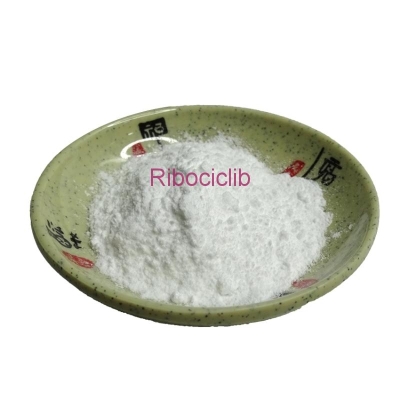-
Categories
-
Pharmaceutical Intermediates
-
Active Pharmaceutical Ingredients
-
Food Additives
- Industrial Coatings
- Agrochemicals
- Dyes and Pigments
- Surfactant
- Flavors and Fragrances
- Chemical Reagents
- Catalyst and Auxiliary
- Natural Products
- Inorganic Chemistry
-
Organic Chemistry
-
Biochemical Engineering
- Analytical Chemistry
- Cosmetic Ingredient
-
Pharmaceutical Intermediates
Promotion
ECHEMI Mall
Wholesale
Weekly Price
Exhibition
News
-
Trade Service
Since its birth in 2012, the CRISPR gene editing technology transformed from the defense system of bacteria/archaea has attracted the attention of scientists all over the world.
With the help of CRISPR technology, people can quickly and accurately manipulate genes and change lives
.
Get rid of hereditary diseases, conquer cancer.
In October 2020, CRISPR gene editing ushered in a bright moment, this technology was only 8 years old and won the Nobel Prize affirmation
.
Since then, CRISPR gene editing has made a series of milestones in clinical treatment, especially in June 2021, the New England Journal of Medicine NEJM published the world's first clinical trial results of CRISPR gene editing therapy in individuals
As CRISPR technology has passed all the way in the field of genetic diseases, more and more scientists and pharmaceutical companies have begun to explore the application of CRISPR in the field of cancer treatment
.
As early as June 2016, Professor Lu You from West China Hospital of Sichuan University started a phase 1 clinical trial of CRISPR gene-edited T cells to treat cancer, and completed the world's first human injection of gene-edited cells on October 28, 2016
.
The research was also published in Nature Medicine, a top international medical journal, on April 28, 2020
We all know that CAR-T cell therapy is a powerful tool for cancer treatment and has shown impressive and powerful effects in a variety of blood cancers
.
However, this type of cell therapy, which extracts the patient's own T cells and transforms them, leads to extremely high prices due to complex procedures and high customization.
In order to solve these problems of CAR-T therapy, many scientists and pharmaceutical companies have begun to develop off-the-shelf CAR-T therapy based on CRISPR gene editing (off-the-shelf CAR-T), which is expected to be realized by transforming T cells through CRISPR gene editing technology.
Let the cell therapy change from a complex therapy of autologous transplantation to a drug for allograft transplantation
.
In this regard, Caribou Biosciences, founded by Allogene Therapeutics and Nobel Prize winner Jennifer Doudna, has developed the fastest.
These two companies have already gone public and have carried out relevant clinical trials
.
However, recently, a patient with lymphoma was treated with Allogene's gene-edited anti-CD19 CAR-T drug candidate ALLO-501A.
All of his blood cell lines were reduced.
Biopsy analysis revealed that his body had chromosomal abnormalities.
Of anti-CD19 CAR-T cells
.
Because chromosomal abnormalities may lead to cancer, considering this serious potential risk, the FDA has suspended all CAR-T clinical trials of Allogene
.
Affected by this news, Allogene's stock price plummeted 46%
Allogene shares fell 46%
Allogene shares fall 46% Allogene shares fall 46%Spread to the whole field
Spread to the whole fieldSo far, it is still unknown why these cells have chromosomal abnormalities.
Chromosomal abnormalities may have occurred during gene editing or rapid cell expansion
.
This clinical trial of Allogene Company uses TALEN editing technology to edit T cells.
Not only was Allogene's stock price plummeting, but also the stock prices of Cellectis and Caribou Biosciences, which also do spot CAR-T therapy, also plummeted
.
This potential risk also makes people worry about the future of gene editing, and the stock prices of several listed CRISPR gene editing companies have also begun to fall
Cellectis shares fell 24%
Cellectis shares fell 24% Cellectis shares fell 24%Caribou Biosciences shares fall 15%
Caribou Biosciences shares fall 15% Caribou Biosciences shares fall 15%Intellia Therapeutics shares fall 10%
Intellia Therapeutics shares fall 10% Intellia Therapeutics shares fall 10%Editas Medicine shares fall 8%
Editas Medicine shares fall 8% Editas Medicine shares fall 8%Potential risks of CRISPR gene editing
Potential risks of CRISPR gene editingCRISPR gene editing is a beautiful tool.
However, this tool is by no means perfect.
Since its birth, CRISPR has been accompanied by off-target concerns
.
In fact, with the optimization of gene editing technology, off-target is no longer the biggest problem it faces, and more risk factors are gradually beginning to be exposed
On April 12, 2021, the Harvard Medical School David Pellman team and others published a paper in the journal Nature Genetics
.
Through single-cell whole-genome sequencing, it was found that CRISPR-Cas9 gene editing can destroy the structure of the cell nucleus, leading to the appearance of micronuclei and chromosome bridges, and ultimately leading to chromosome fragmentation
.
This study shows that our understanding of the safety risks and related mechanisms of CRISPR-Cas9 gene editing technology is still lacking, and we need to be cautious in evaluating the safety of CRISPR gene editing technology
.
Prior to this, many studies have discovered a variety of potential risks that may exist in CRISPR gene editing
.
On June 12, 2018, Nature Medicine published two papers back-to-back, pointing out that CRISPR-Cas9 gene editing can activate p53-induced DNA damage, which means that normal p53 genes will inhibit CRISPR-Cas9 gene editing, which is The p53 gene of the edited cells is likely to be defective, and the risk of cell canceration is increased.
If the cells edited by the CRISPR/Cas9 gene are used for treatment, there will be a potential carcinogenic risk
.
On August 8, 2018, a Nature paper pointed out that CRISPR/Cas9 gene-edited mouse fertilized eggs frequently have a large number of base deletions (in the order of kilobases)
.
On January 28, 2019, a Nature Medicine paper pointed out that the human body has a pre-existing immune response to the Cas9 protein.
Although this is not a safety issue, it will affect the efficacy of CRISPR gene editing
.
This Nature Genetics paper pointed out that the DNA double-strand break introduced during the CRISPR-Cas9 gene editing process may cause chromosome fragmentation.
This is a very destructive form of genome rearrangement that may further lead to oncogenic fusion proteins.
Occurrence or dysregulation of specific gene expression
.
But at present, all companies in the field of clinical therapy development in the field of CRISPR gene editing have not considered this issue
.
David Pellman pointed out that the most studied CRISPR therapy for sickle cell disease and thalassemia is to edit CD34+ hematopoietic stem cells through CRISPR-Cas9 gene in vitro, and then return them to patients.
They estimate that there are some of the returned blood cells.
Millions of cells have micronuclei caused by CRISPR-Cas9, which is at risk of chromosomal fragmentation
.
At present, there are very few people receiving CRISPR-Cas9 therapy in the world.
With the popularization of CRISPR therapy, the problem of genotoxicity leading to serious adverse events is likely to follow
.
Of course, these studies are not intended to slow the development of CRISPR, but to let people know and value the new potential risks of CRISPR gene editing
.
Concluding remarks
Concluding remarksThe most basic requirement of gene editing in clinical application is accuracy and safety
.
As a genetic manipulation involving the DNA level, the side effects of gene editing can undoubtedly cause terrible harm to patients.
Therefore, it is necessary to be cautious when using gene editing technology into clinical use
.
In terms of accuracy, since the birth of CRISPR gene editing technology, off-target effects have always been worrying.
Off-target effects are usually caused by the wrong cutting of DNA.
In addition to improving the accuracy of CRISPR system targeting, the development of DNA cutting activity is lost.
DCas9, and a single-base editor that does not rely on DNA double-strand breaks are also important directions
.
For safety, the human body’s immunogenic reaction to the Cas9 protein of bacterial origin, DNA damage caused by CRISPR-Cas9 activation of p53, the loss of large chromosomal fragments, and the enrichment of p53 inactivating mutations, etc.
, are all A huge obstacle to the application of CRISPR in the human body
.
In recent years, clinical trials of CRISPR gene editing have been carried out one after another, and some clinical trials have also shown good results
.
This shows that there are no insurmountable obstacles to the application of CRISPR gene editing in the human body.
What we need to do is to solve these discovered problems and work hard to develop a safe and effective clinical application of human gene editing
.







